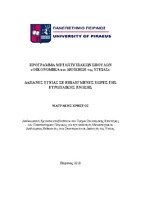Δαπάνες υγείας σε επιλεγμένες χώρες της Ευρωπαϊκής Ένωσης

Προβολή/
Λέξεις κλειδιά
Δαπάνες υγείας ; Μακροοικονομικές μεταβλητές ; ΠαλινδρόμησηΠερίληψη
Ο τομέας της Υγείας, αποτελεί έναν από τους πιο ευαίσθητους αλλά και πολύπλοκους τομείς για την οικονομική ζωή μίας χώρας. Το υψηλό και ποιοτικό επίπεδο της δημόσιας και ιδιωτικής υγείας, δείχνει στοιχεία ευημερίας και ανάπτυξης, αλλά παράλληλα απαιτεί την υψηλή κατανάλωση των διαθέσιμων πόρων του συστήματος υγείας, που διαθέτει μια χώρα. Η προσπάθεια για διαφύλαξη της καθολικότητας στην ελεύθερη πρόσβαση των πολιτών και των ασθενών στα νοσοκομεία για χρήση των υπηρεσιών υγείας αποτελεί τομέα πρόκλησης για την εξαγωγή πληροφοριών, τόσο για τους ερευνητές όσο και για το υπουργείο υγείας μιας χώρας, έτσι ώστε να μπορέσουν να καταλήξουν στο άριστο σημείο, δηλαδή της μέγιστης αποδοτικότητας των συστημάτων υγείας, της μείωσης του κόστους και της αύξησης της ποιότητας των παρεχόμενων υπηρεσιών υγείας.
Σε ένα σύστημα υγείας, η παραγωγικότητα και οι δαπάνες υγείας σχετίζονται άμεσα μεταξύ τους και η σχέση αυτή είναι πολλαπλά τεκμηριωμένη με διάφορες έρευνες και μελέτες που έχουν πραγματοποιηθεί, από τον Παγκόσμιο Οργανισμό Υγείας, ενώ οι χώρες που βρίσκονται σε καλή οικονομική κατάσταση, προστατεύουν και προάγουν τον τομέα της υγείας, για την προστασία των πολιτών. Προκειμένου να υπάρχει σωστή και αποτελεσματική ιατροφαρμακευτική κάλυψη και περίθαλψη, των υγειονομικών αναγκών των πολιτών μίας χώρας, απαιτείται η παρουσίαση ενός ολοκληρωμένου συστήματος υγείας, το οποίο θα ανταποκρίνεται στις ανάγκες των ασθενών, με τη χρήση των κατάλληλων εισροών και των διαθέσιμων πόρων και με τη σωστή χάραξη των διαδικασιών που πρέπει να ακολουθούνται.
Ο σκοπός της παρούσας διπλωματικής εργασίας είναι η προσπάθεια να διερευνηθεί η συμπεριφορά των δαπανών υγείας των χωρών Δανία, Ισπανία, Γαλλία, Ολλανδία και Σουηδία σε σχέση με μερικών βασικών μακροοικονομικών μεταβλητών. Από την εμπειρική ανάλυση προκύπτει πως το Α.Ε.Π., το προσδόκιμο ζωής και ο δείκτης τιμής καταναλωτή είναι στατιστικά σημαντικές, δηλαδή επηρεάζουν τις συνολικές νοσοκομειακές δαπάνες.


